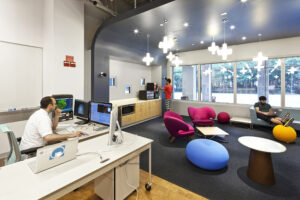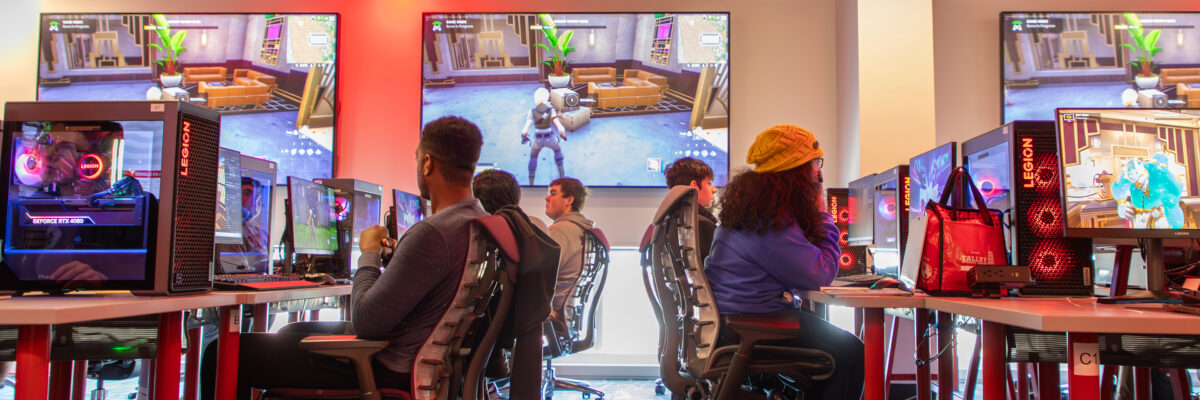By Michael Frank, Associate Principal with NV5 in Raleigh, NC
Esports, or electronic sports, have transcended the realm of casual gaming to become a global phenomenon. With origins dating back to the first recognized tournament in 1972, esports now boasts millions of players and spectators, lucrative sponsorships, and professional leagues.

In the ever-evolving landscape of technology and education, esports has emerged as a dynamic force, captivating millions worldwide. But beyond the screens and virtual arenas, there’s a growing trend of repurposing underutilized spaces into lively esports lounges. These lounges are gaming hubs, community centers, educational platforms, and economic catalysts.
Scholastic esports programs are popping up in schools across the United States, offering students a structured environment to hone their gaming skills while learning valuable lessons in teamwork, strategic thinking, and technological literacy. These programs are more than extracurricular activities; they are becoming part of the core curriculum for sports management, game development, event management and more, providing pathways to college scholarships and careers in the gaming industry.
Many educational institutions and communities have underutilized spaces that can be transformed into esports lounges. These spaces can be revitalized to serve as gaming hubs. The transformation involves more than just setting up gaming consoles; it requires thoughtful design considerations to create an immersive and engaging environment.
IT and Audiovisual Aspects
- High-Performance Hardware: Esports requires top-tier gaming PCs or consoles, displays with high refresh rates, powerful GPUs, and fast processors to ensure smooth gameplay. Monitors with high refresh rates and low response times are crucial for reducing motion blur and providing smooth visuals. Mechanical keyboards, gaming mice with high DPI settings, and headsets with surround sound capabilities are essential for precision and responsiveness during gameplay.
- Network Infrastructure: Reliable, high-speed internet connections with low latency are vital for competitive gaming. This ensures minimal lag and smooth gameplay. Sufficient bandwidth to support multiple simultaneous connections and network redundancy to prevent disruptions are critical. Implementing robust security measures to protect against cyber threats and ensure uninterrupted gameplay is also important
- AV Technology: Advanced AV technology heightens the gaming and viewing experience. This includes high-definition displays, sound systems, and professional-grade streaming equipment. Viewing experience is enhanced by immersive, community-driven environments that offer experiences far beyond what’s possible in a private setting.
- Streaming and Broadcasting: Esports lounges should be equipped with streaming setups that include cameras, microphones, and streaming software like OBS Studio or Streamlabs OBS. These tools allow for high-quality broadcasts and live streams, engaging a wider audience. Popular streaming platforms include Twitch, YouTube, Facebook Gaming, and Discord, each offering unique features for engaging viewers.
- Centralized Control: Managing the AV setup can be streamlined with centralized control systems. These systems allow administrators to switch between game feeds, adjust audio levels, and control the overall presentation from a single interface, ensuring a seamless experience

North Carolina State University’s (NCSU) focus on esports is a prime example of how underutilized spaces can be transformed. Driven by student demand and faculty support, NCSU created a dedicated esports space that has been met with enthusiasm. The university utilized an unused room of the library to create a trial space to gauge interest and test new technologies. Following the pilot room’s success, NCSU decided to create a 300-seat arena, practice lab, and esports support space to foster a positive environment for the growing esports interest. The project involved careful planning and design, resulting in a space that serves both competitive and recreational gamers. The success of NCSU’s esports lounge highlights the potential for other institutions to follow suit.
Transforming underutilized spaces into esports lounges has broader implications. It legitimizes gaming as a career path, provides students with new opportunities, and fosters a sense of community. Moreover, it can drive economic growth by attracting events, sponsorships, and tourism.
With the growth of the esports industry, this transformation will significantly influence the future of gaming and education. Converting underutilized areas into esports spaces is more than a passing trend; it’s a movement that unites passion, education, and competition. By reimagining these spaces, we can establish vibrant centers that inspire, educate, and entertain.
Michael Frank is an associate principal with NV5 in Raleigh, NC with over 25 years of experience in the technology industry.

